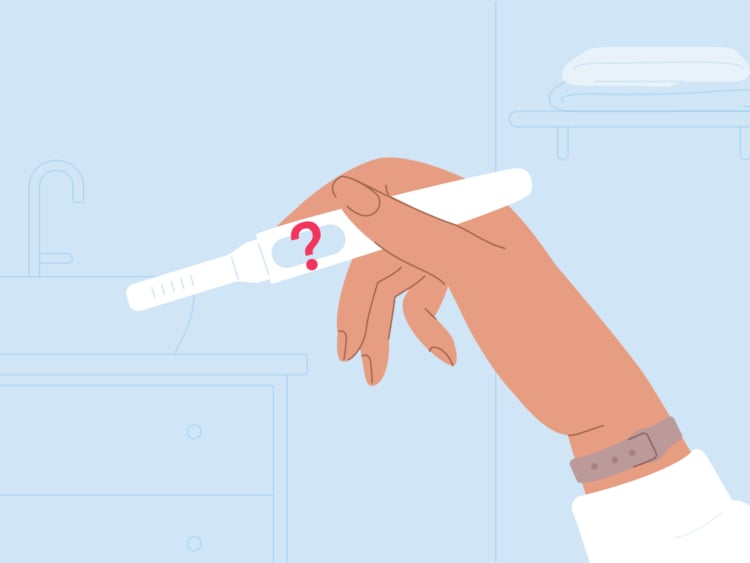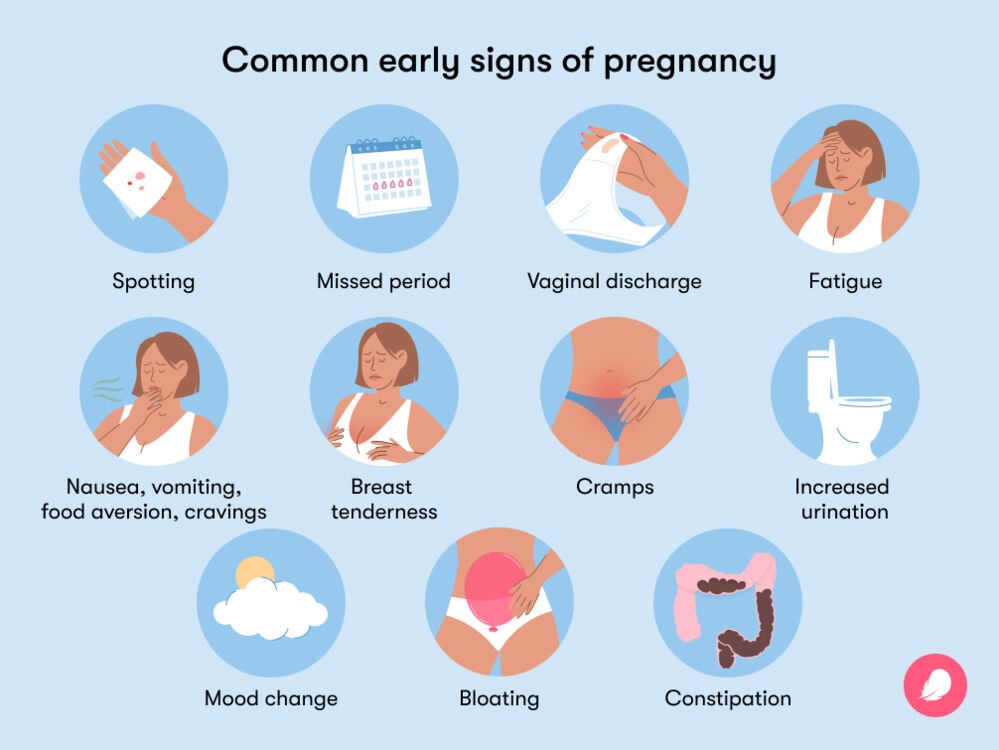From a missed period to discharge and cramps, let’s take a look at some of the early signs of pregnancy.
-
Tracking cycle
-
Getting pregnant
-
Pregnancy
-
Help Center
-
Flo for Partners
-
Anonymous Mode
-
Flo app reviews
-
Flo Premium New
-
Secret Chats New
-
Symptom Checker New
-
Your cycle
-
Health 360°
-
Getting pregnant
-
Pregnancy
-
Being a mom
-
LGBTQ+
-
Quizzes
-
Ovulation calculator
-
hCG calculator
-
Pregnancy test calculator
-
Menstrual cycle calculator
-
Period calculator
-
Implantation calculator
-
Pregnancy weeks to months calculator
-
Pregnancy due date calculator
-
IVF and FET due date calculator
-
Due date calculator by ultrasound
-
Medical Affairs
-
Science & Research
-
Pass It On Project New
-
Privacy Portal
-
Press Center
-
Flo Accuracy
-
Careers
-
Contact Us
Very early signs of pregnancy: Are you expecting a baby?


Every piece of content at Flo Health adheres to the highest editorial standards for language, style, and medical accuracy. To learn what we do to deliver the best health and lifestyle insights to you, check out our content review principles.
Do you think you might be pregnant? There are all sorts of signs and symptoms that your body shows during the early stages of pregnancy, and some of them might even pop up before you get a positive pregnancy test. Let’s dive in and find out what they are.
Key takeaways
- You could experience pregnancy symptoms as early as two to three weeks after ovulation.
- Early pregnancy symptoms are different for everyone.
- Are you wondering, “When can I take a pregnancy test?” For an accurate result, a pregnancy test should be taken the day after a missed period, ideally in the morning.
How early can you spot the first signs of pregnancy?
First things first: How early can you show signs of pregnancy? The answer will vary from person to person, but you can expect to experience very early pregnancy symptoms around two or three weeks after ovulation if conception occurred. You can use a fertility tracking app like Flo to help you predict when you're likely to be ovulating.
Some people may experience the signs earlier, while others might not notice them until after a missed period. “Sometimes it could be a little earlier or a little later, but most of the time, it’s around the four- to five-week mark [since the first day of your last period] that you start to feel signs,” explains Dr. Charlsie Celestine, obstetrician and gynecologist, New Jersey, US.

 Over
7.8M
ratings averaging
4.8/5
*
Over
7.8M
ratings averaging
4.8/5
*
Understand your body’s signals with the Flo app
- Chat with others who are trying to get pregnant.
- Get trusted information on signs of pregnancy from 100+ medical experts.
- Log your symptoms and learn what they could be trying to tell you.
 Over
7.8M
ratings averaging
4.8/5
*
Over
7.8M
ratings averaging
4.8/5
*

Trying to conceive?
The Flo app can help you through the two-week wait.

 Over
7.8M
ratings averaging
4.8/5
*
Over
7.8M
ratings averaging
4.8/5
*
Understand your body’s signals with the Flo app
- Chat with others who are trying to get pregnant.
- Get trusted information on signs of pregnancy from 100+ medical experts.
- Log your symptoms and learn what they could be trying to tell you.
Does everyone experience early pregnancy symptoms in the same way?
Everyone is different, and early pregnancy symptoms can vary a lot between different people. If you think you might be pregnant but haven’t experienced any early symptoms, you still might be.
That said, a missed period is often the first sign, followed by symptoms such as vomiting, nausea, and breast tenderness. Are you wondering how late a period can be? If you’re concerned about a missed period or any other symptoms that could potentially be an early sign of pregnancy, it’s a good idea to take a pregnancy test and speak to a health care professional.
Don’t forget you can also use our handy pregnancy test calculator to help you decide whether it’s time to take a pregnancy test or not.
Could you experience symptoms before missing your period?
Yes, it is possible to feel pregnant before missing your period. Some people feel pregnant within a week of conception, while others won’t feel any different until much later.
Bear in mind that some premenstrual symptoms overlap with early pregnancy symptoms, which can make it hard to tell the difference between the two (thanks, Mother Nature!). For example, breast tenderness, bloating, and fatigue are common PMS symptoms, as well as early pregnancy symptoms (more on that below). Confusing, right? Thankfully, it won’t be long before you’ll know one way or another when your period is due.
READ MORE: What are the chances of pregnancy after birth control?
Take a quiz
Find out what you can do with our Health Assistant
Most common early signs of pregnancy
As we’ve explored, everyone is different, but there are some symptoms that many women experience when pregnant. As well as a missed period, some of the very early signs of pregnancy can include nausea, breast tenderness, and spotting.
A missed period
According to Dr. Celestine, one of the common first signs of pregnancy is the classic one: a missed period. “That’s usually around what we call 4 weeks pregnant,” she explains. “Even though it might seem like less than that, we count it from the first day of your last period.” Don’t forget using a period tracker such as Flo can help you determine whether you’ve missed a period or not.
Nausea and vomiting
Two other common (and admittedly less pleasant) early signs of pregnancy are nausea and vomiting, or pregnancy sickness. One study found that around 70% to 85% of women experienced these symptoms, so if you find yourself feeling queasy or are physically sick, take comfort in knowing you’re not alone. You might have both symptoms at the same time or only experience one. “Some people only feel nauseous, and some people vomit constantly,” says Dr. Celestine.
These signs of early pregnancy are most likely to appear after a missed period. “Nausea and vomiting are most commonly experienced at around 7 to 8 weeks,” she adds.
Food aversion and cravings
Do you find yourself horrified at the thought of eating your usual lunchtime sandwich while also feeling a sudden and inexplicable craving for something you’ve never liked to eat before? Or perhaps it’s a strange new combination of foods that’s suddenly weirdly appealing? These are also common early signs of pregnancy to look out for. In the early days of pregnancy, around 3 weeks after conception, 54% of women experience food aversions. This means you might have a more sensitive sense of smell or have strong negative reactions to certain foods and drinks, even if they are things you usually enjoy.
You could also have pregnancy cravings for new foods that you wouldn’t usually eat — something that happens to 61% of women. Are you wondering if anyone else has experienced your immense and insatiable pregnancy craving for pickles? You can find out about the nine most common pregnancy food cravings here.
Breast tenderness
You might also be able to spot the very early signs of pregnancy by how your breasts feel. According to one study, 76.2% of women experienced breast pain or tenderness in the 1st trimester. Breast tenderness can occur from a few days to 1 to 2 weeks after conception and is caused by the change in hormones in your body that occur during a pregnancy.
This might be an early sign of pregnancy before a missed period, as you can experience it as early on in your pregnancy as 1 or 2 weeks after conception. “It’s different for everyone, and some people don’t get it all,” says Dr. Celestine. “It’s caused by an increase in both estrogen and progesterone in pregnancy.”
Spotting
The term “spotting” usually refers to light bleeding that happens outside of your normal period. While this might be an alarming symptom to experience, it’s not necessarily a cause for concern. Spotting in early pregnancy can be due to implantation bleeding, which is perfectly normal and can occur when the embryo implants itself into the wall of the uterus, usually around 10 to 14 days after conception.
Spotting is also common in the 1st trimester of pregnancy, with around 25% of pregnant women experiencing bleeding in the first 12 weeks of their pregnancy.
Dr. Celestine advises anyone experiencing this kind of “abnormal period” to take a pregnancy test. If it’s positive, she says it’s a good idea to monitor the bleeding. Implantation bleeding typically lasts for one to two days and is very light; it’s usually not enough to need any more protection than a panty liner. Unfortunately, bleeding any more than this can sometimes be a sign of a miscarriage or an ectopic pregnancy. As scary as this sounds, try not to panic; one study found that one in four pregnant people reported bleeding, but only around one in 10 women (12%) who experienced bleeding had a miscarriage.
So rest assured, “A lot of times, pink, brown, or red spotting can still be a normal pregnancy,” explains Dr. Celestine. That said, it’s a good idea to get any bleeding in pregnancy checked by your doctor.

Cramps
Just as you might have cramps during your period, you might also have some cramping in the early stages of pregnancy. This might happen during implantation, known as implantation cramping, but it’s worth noting there is currently little scientific evidence around this phenomenon.
“If you experience mild cramping, just like if you experience mild spotting, then keep an eye on it,” advises Dr. Celestine. “But if it’s severe pain and heavy bleeding, then we need to look into it as soon as possible because it could be a miscarriage,” Dr. Celestine says. This could also be a sign of an ectopic pregnancy. It’s important to consider how intense the cramping is, as mild cramping is not necessarily a cause for concern, so try not to jump to conclusions and cause yourself unnecessary worry. Book a checkup with your health care professional. They’ll be able to examine you and do some tests if necessary.
Vaginal discharge
You may know this already, but just to recap: Vaginal discharge and cervical mucus change throughout your cycle. Before ovulation, your discharge will be thick, white, and dry. Then, right before ovulation happens, it becomes clear and slippery, a bit like egg whites. This is to make it easier for a potential sperm to swim up through your cervix and meet an egg.
After ovulation, your cervical mucus will thicken and become sticky or tacky. Sometimes cervical mucus and vaginal discharge can be more plentiful early on in pregnancy; for some women, this can be an early sign that they are pregnant.
What about expecting a change in urine color during pregnancy? “No, definitely not,” Dr. Celestine says. “It’s not related. Urine color has to do with what [and how much] you eat and drink in all people, whether pregnant or not.”
Mood change
Obviously, a bad mood could be caused by many things, but mood swings are one of the early signs of pregnancy, experienced as early as 3 weeks after conception. “Some people feel more irritable,” says Dr. Celestine. If you’re feeling anxious or depressed, you’re not alone. These are the most common mental health concerns during pregnancy — around 12% of women experience depression, while 13% experience anxiety. These can be understandably difficult feelings to navigate, so if you need support, don’t hesitate to reach out to loved ones or your doctor.
Fatigue
Hands up if you feel absolutely exhausted! Dr. Celestine says that while fatigue isn’t usually the first sign of pregnancy, people do tend to experience tiredness in the 1st trimester. In some people, that could be as early as 1 week after conception. For others? “A little after the nausea and vomiting, so after 7 or 8 weeks, people usually start to feel more tired,” she explains. That makes sense, considering your body is creating an entirely new human from scratch. Try to take it easy and nap if you need to.
Increased urination
Do you feel like you need to pee a lot? If you’re visiting the bathroom more often than usual, including during the night, that could be an early sign of pregnancy. This is because you have increased blood levels during pregnancy. Your blood is filtered by your kidneys, which remove the extra waste fluid, which then leaves your body as urine. Basically, the more blood you have in your body, the more you will need to pee. This can happen as early as 3 weeks after conception, although Dr. Celestine explains that this symptom tends to be more noticeable in the 3rd trimester because of “pressure on the bladder from the uterus due to having a larger uterus and baby.”
Bloating
Bloating is another early sign of pregnancy, thought to be caused by a rise in progesterone. You’ll likely experience this around a week after ovulation; although, remember that bloating can be caused by a wide range of things, including eating a large meal too quickly (we’ve all been there).
Constipation
It might not be the most pleasant early sign of pregnancy, but you could find yourself becoming constipated as early as 3 weeks after conception. In fact, one study found that between 11% and 38% of pregnant people experienced constipation at some point in their pregnancy, usually around the 3rd trimester. Again, you can likely thank a rise in progesterone for this one.

Less common early signs of pregnancy
While many of the very early signs of pregnancy are well known, there are some less obvious indications, too. Read on to find out more about unusual signs of early pregnancy.
Headaches
A headache might not be the most obvious sign of pregnancy, but it can be an early symptom. “Sometimes I’ve seen people have headaches early on. It can happen with hormone changes,” explains Dr. Celestine. The most common headaches associated with pregnancy are migraines and tension headaches. Research shows that tension headaches account for 26% of all headaches experienced during pregnancy, while up to 10% of pregnant women will experience a migraine without aura (a migraine with aura is where you also experience sensory symptoms such as flashes of light or blind spots).
A range of things can cause headaches during early pregnancy, including changing hormones, nasal congestion (more on that below), hunger, and low blood sugar levels. If you’re (understandably) struggling with pregnancy headaches, experts recommend trying some physical exercise, drinking lots of water, getting enough sleep (easier said than done, we know!), eating regularly, and practicing some relaxation techniques.
Nasal congestion
If you have a stuffy or runny nose, that could be because of a rise in hormone levels and blood production. This happens in pregnancy and can cause the mucous membranes in your nose to swell. Known as “rhinitis,” around 39% of women experience it, and the main symptoms are sneezing, nasal congestion, and a runny nose. It can start at any point but should stop after you give birth. Keep that in mind when you’re buying your one-hundred-fiftieth multipack of pocket tissues at the grocery store!
Dizziness
For some people, feeling dizzy can be one of the first signs of pregnancy. This can be caused by a few things that can happen during pregnancy, including hormonal changes that cause your blood pressure to be lower than usual, having lower blood sugar, overheating more easily, or having anemia or low iron levels.
So, if you’ve noticed your head spinning when you get up too quickly, it could be a sign that you’re pregnant. But as there are multiple other reasons for feeling dizzy, from having an ear infection to stress and anxiety, it might be best not to jump to conclusions and schedule a checkup with your doctor.
Metallic taste
One of the stranger early pregnancy symptoms is noticing a metallic taste in your mouth, as if you’ve eaten a pile of coins. For some pregnant people, it happens after eating certain foods, while others may notice it happens randomly throughout the day. The good news is this symptom is usually temporary and will go away on its own.
Smell sensitivity
Many women experience a stronger sense of smell during pregnancy, particularly in the early stages. So, if you find yourself unusually offended by strong odors like cigarette smoke, spoiled food, perfumes, or coffee, it could be a sign of pregnancy.
Basal body temperature changes
Changes to your basal body temperature (BBT) can also be one of the early signs of pregnancy before a missed period. Thanks to an increase in progesterone, your temperature rises very slightly after ovulation. Some women take their BBT temperature each morning using a basal thermometer (a thermometer showing two decimal places) to track their cycles and figure out when they’re most likely to ovulate each month.
Usually, your temperature will dip again right before you get your period — but if you get pregnant, your temperature will stay elevated. So, a consistently high temperature after ovulation could be an early pregnancy sign.
However, it’s important to know that BBT tracking may be tricky, as body temperature can also be affected by factors like sleep, alcohol use, or even a fever. So, you should always take a pregnancy test to confirm whether you’re pregnant or not if you notice BBT changes.
When is the right time to take a pregnancy test?
We know the wait between ovulation and taking a pregnancy test can feel long, and it can be tempting to take one right away. If you’re worried about the idea of a possible pregnancy, waiting can undoubtedly be hard to do. However, a very early pregnancy can be difficult to detect with a home pregnancy test, and experts recommend you wait until the day after a missed period to make sure it’s more accurate.
Once you realize that you’ve missed your period, Dr. Celestine recommends taking a pregnancy test. She advises doing it first thing in the morning. “The urine pregnancy test needs a certain amount of the pregnancy hormone in order to register as positive,” she explains. The pregnancy hormone is called human chorionic gonadotropin (hCG), and it increases during pregnancy. HCG begins to be released after the fertilized egg implants. This can be as early as 10 days after the egg is fertilized.
“It comes out in your urine, so the first pee in the morning usually has the highest concentration of that pregnancy hormone because it builds up in your system all night,” explains Dr. Celestine. She explains that during the day, as you eat, drink, and urinate, your urine may be diluted. “So the morning is the best time to do it, especially if you’re testing early on in the pregnancy,” she says.
Is it possible to have early pregnancy symptoms and not be pregnant?
If you have symptoms that seem like the early signs of pregnancy, it doesn’t necessarily mean you are pregnant. Dr. Celestine reminds us that there’s a lot of overlap with your period, for example. “A lot of times, PMS has similar symptoms — bloating, nausea, breast tenderness,” she explains.
Cramping or spotting could be symptoms of many things. “If you’re looking at cramping or spotting, it can even be an STI, an ovarian cyst, polyps [an overgrowth of tissue that’s usually benign] in the uterus, or fibroids on the uterus. Any other type of vaginal infection can also lead to spotting sometimes,” explains Dr. Celestine. “There are so many other things it could be. So if you’re ever concerned that it’s a pregnancy or you miss your period, I would take a pregnancy test and see a doctor.”
When is the right time to see the doctor about your early pregnancy?
If you take a pregnancy test at home and it’s positive, give your doctor a call (or find a doctor if you don’t have one) and book an appointment to discuss prenatal care. Your first visit will usually be between 8 to 12 weeks pregnant, although the exact timing will depend on both your health needs and history, as well as your doctor’s care plan.
And what can you expect during this first visit? One of the most important things is to confirm that your growing baby has healthy heart activity, which will be done by either an ultrasound or by listening with a handheld Doppler. But keep in mind that even an ultrasound can’t visualize a baby until around 5.5 weeks, so don’t panic if this doesn’t happen before then.
If, however, you have a missed period but a pregnancy test is negative, Dr. Celestine recommends waiting a week and doing another one. After that, if you haven’t had your period and a pregnancy test is still negative, she advises seeing a doctor to find out what’s going on. “That’s as long as you’re feeling fine,” she says, adding that you should see a doctor right away if you’re in severe pain or have concerns.
If you’d been hoping for a positive pregnancy test, try not to be too disheartened if it doesn’t happen right away. It’s totally natural to feel disappointed, but remember that around 85% of people will conceive within the first year of trying, so try to focus on your next cycle. If you feel like you’ve had a lucky escape with a negative pregnancy test, it might be a sign it’s worth rethinking your contraceptive method.
FAQs
How does your lower abdomen feel in early pregnancy?
Some people may experience mild cramping as one of the early pregnancy signs, but not everyone does. So if your tummy feels no different than usual, and you’re wondering how to tell if you’re pregnant, it might be best to wait for a delayed period and take a pregnancy test — as frustrating as that can be.
What does pregnancy discharge look like?
During pregnancy, some women will experience more vaginal discharge than before pregnancy. But the discharge you have might change, too. “Sometimes your vaginal discharge might change because of the new hormones with the pregnancy,” says Dr. Celestine. She explains that “increased estrogen causes a white milky discharge.”
Can stress cause false pregnancy symptoms?
Stress can cause long cycles and even temporarily stop your periods altogether. This means that some people may mistake a missed period due to stress as a sign of pregnancy. Stress can also cause some of the other symptoms discussed above, including fatigue, dizziness, and headaches.


Hey, I'm Anique
I started using Flo app to track my period and ovulation because we wanted to have a baby.


The Flo app helped me learn about my body and spot ovulation signs during our conception journey.


I vividly
remember the day
that we switched
Flo into
Pregnancy Mode — it was
such a special
moment.
Real stories, real results
Learn how the Flo app became an amazing cheerleader for us on our conception journey.
References
“Am I Pregnant?” Cleveland Clinic, my.clevelandclinic.org/health/articles/9709-pregnancy-am-i-pregnant. Accessed 3 Nov. 2022.
Antenatal and Postnatal Mental Health: Clinical Management and Service Guidance. National Institute for Health and Care Excellence, 17 Dec. 2014, www.nice.org.uk/guidance/cg192/resources/antenatal-and-postnatal-mental-health-clinical-management-and-service-guidance-pdf-35109869806789.
“Basal Body Temperature.” Cleveland Clinic, my.clevelandclinic.org/health/treatments/21065-basal-body-temperature. Accessed 6 Sep. 2023.
“Basal Body Temperature for Natural Family Planning.” Mayo Clinic, 10 Feb. 2023, www.mayoclinic.org/tests-procedures/basal-body-temperature/about/pac-20393026.
Bayley, Tracy M., et al. “Food Cravings and Aversions during Pregnancy: Relationships with Nausea and Vomiting.” Appetite, vol. 38, no. 1, Feb. 2002, pp. 45–51, doi:10.1006/appe.2002.0470.
Cameron, E. Leslie. “Pregnancy and Olfaction: A Review.” Frontiers in Psychology, vol. 5, Feb. 2014, p. 67, https://doi.org/10.3389/fpsyg.2014.00067.
“Cervical Mucus.” Cleveland Clinic, my.clevelandclinic.org/health/body/21957-cervical-mucus. Accessed 6 Sep. 2023.
“Dizziness and Fainting in Pregnancy.” Health Service Executive, www2.hse.ie/conditions/dizziness-and-fainting-pregnancy/. Accessed 6 Sep. 2023.
Dzieciolowska-Baran, Edyta, et al. “Rhinitis as a Cause of Respiratory Disorders during Pregnancy.” Advances in Experimental Medicine and Biology, vol. 755, 2013, pp. 213–20, doi:10.1007/978-94-007-4546-9_27.
“Ectopic Pregnancy.” Mayo Clinic, 12 Mar. 2022, www.mayoclinic.org/diseases-conditions/ectopic-pregnancy/symptoms-causes/syc-20372088.
Ellilä, Pauliina, et al. “Nausea and Vomiting of Pregnancy: A Study with Pregnancy-Unique Quantification of Emesis Questionnaire.” European Journal of Obstetrics, Gynecology, and Reproductive Biology, vol. 230, Nov. 2018, pp. 60–67, doi:10.1016/j.ejogrb.2018.09.031.
“Fertilization and Implantation.” Mayo Clinic, www.mayoclinic.org/healthy-lifestyle/pregnancy-week-by-week/multimedia/fertilization-and-implantation/img-20008656. Accessed 6 Sep. 2023.
“Fetal Pole.” Cleveland Clinic, my.clevelandclinic.org/health/body/22546-fetal-pole. Accessed 30 Nov. 2022.
Hasan, Reem, et al. “Patterns and Predictors of Vaginal Bleeding in the First Trimester of Pregnancy.” Annals of Epidemiology, vol. 20, no. 7, July 2010, pp. 524–31, doi:10.1016/j.annepidem.2010.02.006.
“Pregnancy FAQs.” NHS, www.nhs.uk/start4life/pregnancy/pregnancy-faqs/. Accessed 30 Nov. 2022.
“What Can I Do about Headaches during Pregnancy? I’d Rather Not Take Medication.” Mayo Clinic, 10 Aug. 2022, www.mayoclinic.org/healthy-lifestyle/pregnancy-week-by-week/expert-answers/headaches-during-pregnancy/faq-20058265.
“Headaches in Early Pregnancy.” Johns Hopkins Medicine, www.hopkinsmedicine.org/health/conditions-and-diseases/staying-healthy-during-pregnancy/headaches-in-early-pregnancy. Accessed 6 Sep. 2023.
“Headaches in Pregnancy.” NHS, www.nhs.uk/pregnancy/related-conditions/common-symptoms/headaches/. Accessed 6 Sep. 2023.
Hendriks, Erin, et al. “First Trimester Bleeding: Evaluation and Management.” American Family Physician, vol. 99, no. 3, Feb. 2019, pp. 166–74, https://pubmed.ncbi.nlm.nih.gov/30702252/.
“Home Pregnancy Tests: Can You Trust the Results?” Mayo Clinic, 23 Dec. 2022, www.mayoclinic.org/healthy-lifestyle/getting-pregnant/in-depth/home-pregnancy-tests/art-20047940.
Jukic, Anne Marie Z., et al. “Analgesic Use at Ovulation and Implantation and Human Fertility.” American Journal of Obstetrics and Gynecology, vol. 222, no. 5, May 2020, pp. 476.e1–476.e11, doi:10.1016/j.ajog.2019.11.1251.
“Menstrual Cramps.” Mayo Clinic, 30 Apr. 2022, www.mayoclinic.org/diseases-conditions/menstrual-cramps/symptoms-causes/syc-20374938.
“Metallic Taste.” Health Service Executive, www2.hse.ie/conditions/metallic-taste/. Accessed 6 Sep. 2023.
“Missed or Late Periods.” NHS, www.nhs.uk/conditions/missed-or-late-periods/. Accessed 6 Sep. 2023.
“Miscarriage: Symptoms.” NHS, www.nhs.uk/conditions/miscarriage/symptoms/. Accessed 30 Nov. 2022.
Nazik, Evsen, and Gulsen Eryilmaz. “Incidence of Pregnancy-Related Discomforts and Management Approaches to Relieve Them among Pregnant Women.” Journal of Clinical Nursing, vol. 23, no. 11–12, June 2014, pp. 1736–50, doi:10.1111/jocn.12323.
Negro, A., et al. “Headache and Pregnancy: A Systematic Review.” The Journal of Headache and Pain, vol. 18, no. 1, Oct. 2017, p. 106, doi:10.1186/s10194-017-0816-0.
“Pregnancy Constipation.” Cleveland Clinic, my.clevelandclinic.org/health/diseases/21895-pregnancy-constipation. Accessed 30 Nov. 2022.
“Pregnancy Tests.” Cleveland Clinic, my.clevelandclinic.org/health/articles/9703-pregnancy-tests. Accessed 6 Sep. 2023.
“Premenstrual Syndrome (PMS).” The American College of Gynecologists and Obstetricians, May 2021, www.acog.org/womens-health/faqs/premenstrual-syndrome.
“Prenatal Care: 1st Trimester Visits.” Mayo Clinic, 6 Aug. 2022, www.mayoclinic.org/healthy-lifestyle/pregnancy-week-by-week/in-depth/prenatal-care/art-20044882.
“Session 24: Ovulation and Fecundity.” Human Reproduction, vol. 25, suppl. 1, June 2010, pp. I37–38, https://doi.org/10.1093/humrep/de.25.s1.24.
“Signs and Symptoms of Pregnancy.” NHS, www.nhs.uk/pregnancy/trying-for-a-baby/signs-and-symptoms-of-pregnancy/. Accessed 3 Nov. 2022.
“Stress.” Cleveland Clinic, my.clevelandclinic.org/health/articles/11874-stress. Accessed 6 Sep. 2023.
“Symptoms of Pregnancy: What Happens First.” Mayo Clinic, 3 Dec. 2021, www.mayoclinic.org/healthy-lifestyle/getting-pregnant/in-depth/symptoms-of-pregnancy/art-20043853.
“Is Implantation Bleeding Common in Early Pregnancy?” Mayo Clinic, 19 Apr. 2022, www.mayoclinic.org/healthy-lifestyle/pregnancy-week-by-week/expert-answers/implantation-bleeding/faq-20058257
“Ultrasound.” Cleveland Clinic, my.clevelandclinic.org/health/diagnostics/4995-ultrasound. Accessed 3 Nov. 2022.
Vazquez, Juan C. “Constipation, Haemorrhoids, and Heartburn in Pregnancy.” BMJ Clinical Evidence, vol. 2010, Aug. 2010, www.ncbi.nlm.nih.gov/pubmed/21418682.
“Vaginal Discharge in Pregnancy.” NHS, www.nhs.uk/pregnancy/related-conditions/common-symptoms/vaginal-discharge/. Accessed 1 Dec. 2022.
“What Are Some Common Signs of Pregnancy?” Eunice Kennedy Shriver National Institute of Child Health and Human Development, www.nichd.nih.gov/health/topics/pregnancy/conditioninfo/signs. Accessed 3 Nov. 2022.
“What to Expect Each Trimester.” Mayo Clinic Health System, www.mayoclinichealthsystem.org/locations/eau-claire/services-and-treatments/prenatal-care/prenatal-visits/what-to-expect-each-trimester. Accessed 15 Nov. 2022.
“Your Antenatal Appointments.” NHS, https://www.nhs.uk/pregnancy/your-pregnancy-care/your-antenatal-appointments/. Accessed 6 Sep. 2023.
“Week 4.” NHS, www.nhs.uk/start-for-life/pregnancy/week-by-week-guide-to-pregnancy/1st-trimester/week-4/. Accessed 6 Sep. 2023.
History of updates
Current version (22 September 2023)
Published (09 November 2018)
In this article

Get your personal guide to fertility
-
Learn how to read your body's ovulation signals
-
Find daily conception tips from our experts
-
Chat with others who are trying to get pregnant




